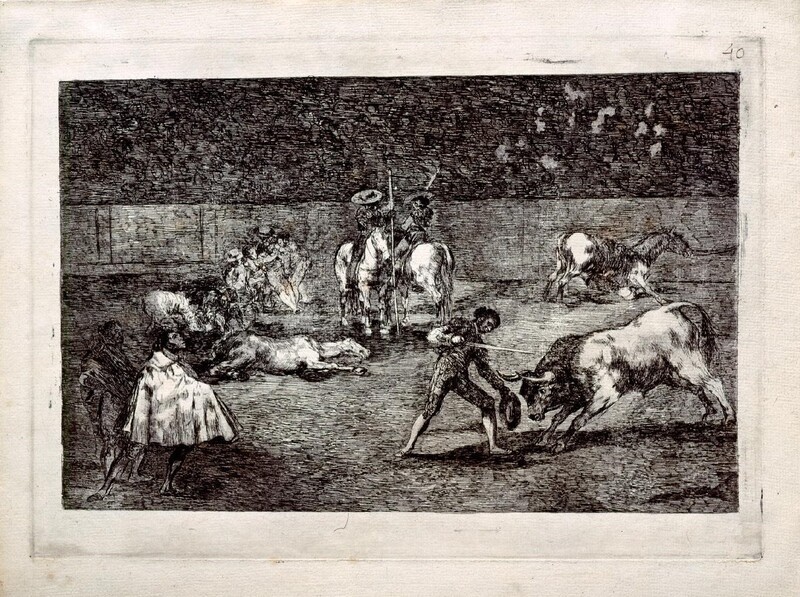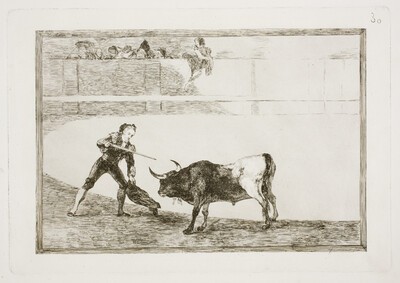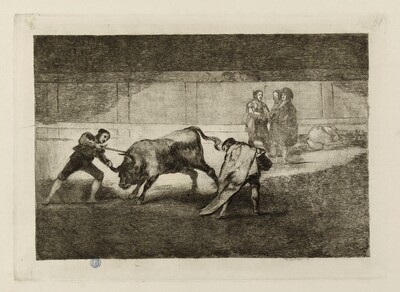- Cronología
- 1814 - 1816
- Dimensiones
- 248 x 350 mm
- Técnica y soporte
- Reconocimiento de la autoría de Goya
- Documented work
- Titular
- Lázaro Galdiano Foundation
- Ficha: realización/revisión
- 03 Oct 2021 / 22 Jun 2023
- Inventario
- 225
- Otros títulos:
-
40 (pen, upper right-hand corner)
See How the ancient Spaniards hunted bulls on horseback in the countryside
This work is one of a group of five prints discarded by Goya and not included in the first edition of the Bullfighting, of which the copper plates have not survived, so they could not have been included in later editions of the series, as was the case with the seven that Loizelet added in 1876 in the third edition. Of the five prints mentioned above, identified by Gassier with the letters H-L, only a few state proofs and their preparatory drawings have survived. Of a sixth print, of which the copper was never opened, only the preparatory drawing is extant.
Only two state proofs of the present print have survived, both with the etching and aquatint, one in the National Library of Spain (Inv. 45682) and the other in the Lázaro Galdiano Museum in Madrid (IB.14866/6). Both proofs are from the same and only known state. The one in the Lázaro Galdiano Museum was acquired by José Lázaro before 1922 and was previously in the Galichon Collection. The one in the Biblioteca Nacional, which has a perimeter frame, belonged to the collection of Valentín Carderera, who bought it from Mariano Goya y Goicoechea, the painter's grandson, according to a handwritten annotation by Carderera himself included in the state proof: Purchased from Goya's grandson. The plates were broken.
The catalogue data and the image reproduced correspond to the proof of condition of the Lázaro Galdiano Museum in Madrid.
See How the ancient Spaniards hunted bulls on horseback in the countryside
A scene full of characters that reflects a typical moment of a bullfight in Goya´s time. In the foreground, a bullfighter enters to kill the bull, drawing his attention to him with a hat instead of a crutch. The bull, in a perfect foreshortened view and showing movement, goes strainght towards the bullfighter. On the left we see several figures in capes inside the arena, probably subalterns, and a dead horse lying in the ring, while a little further back we can see the injuried bullfighter to whom the horse belonged being led out of the arena.
In the centre of the scene, in the background, are two other bullfighters on their mounts, one on his back and the other on his front, who remain in the ring in case their intervention is required. In the corner on the right is another horse that is mortally wounded, its guts hanging out after a goring. In the background we can see the ringside seats and the audience can be glimpsed, just in outline.
It is a very dark scene, with certain points of light on the backs of the animals and on some of the clothes of some of the characters in the ring.
Lafuente Ferrari suggests a relationship between the group of subalterns or bullfighters with capes on the left and the Disparates. He also relates the disembowelled horse to the Disasters of War. He also points out that there are certain variations in the print with respect to the preparatory drawing. Luján, for his part, suggests that the plate is very deteriorated and that this is why Goya rejected it. Sánchez Cantón, refining his argument considerably, states that the fortune depicted was executed by Pepe Illo in Cádiz in 1778.
Because of the suerte depicted, the work is thematically related to two other prints by Goya of bullfighting and its extensions that reflect the suerte de matar or suerte suprema: Pedro Romero killing a standing bull and A killer plunges his rapier, grabbing the bull by the horn (Bullfighting L).
There is a preparatory drawing of the present print, also entitled A bullfighter entering to kill with a hat in his hand instead of a crutch (Bullfighting I)
-
Madrid1928
-
Madrid1990cat. 60-61
-
Ydioma universal: Goya en la Biblioteca NacionalBiblioteca NacionalMadrid1996from September 19th to December 15th 1996cat. 287
-
1868p. 175
-
MadridBlass S.A.1918p. 140
-
1941pp. 185-186
-
1946pp. 177-216, espec. pp. 214-215
-
BarcelonaTartessos-F. Oliver Branchfelt1946 (reed. 1951)
-
OxfordBruno Cassirer1964vol. II, 1964, p. 359, cat. 245
-
Vie et ouvre de Francisco de GoyaParísOffice du livre1970p. 281, cat. 1235
-
MilwakeeMilwaukee Art Museum1986p. 20
-
Goya, toros y torerosMadridMinisterio de Cultura, Comunidad de Madrid1990p. 125
-
Catálogo de las estampas de Goya en la Biblioteca NacionalMadridMinisterio de Educación y Cultura, Biblioteca Nacional1996cat. 369
-
Ydioma universal: Goya en la Biblioteca NacionalMadridBiblioteca Nacional, Sociedad Estatal Goya 96 y Lunwerg1996p. 254
-
Goya en la Fundación Lázaro GaldianoMadridFundación Lázaro Galdiano1999p. 186, cat. 43
-
MadridMuseo Nacional del Prado2001p. 108
-
Goya. In the Norton Simon MuseumPasadenaNorton Simon Museum2016pp. 186-201



